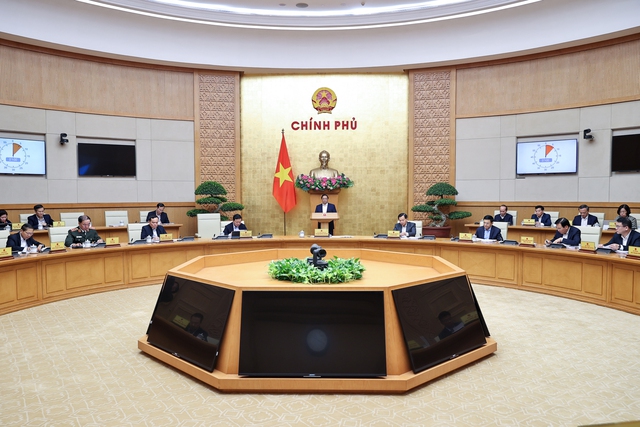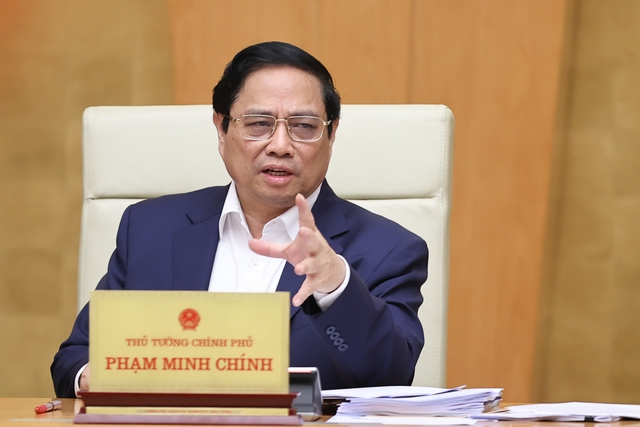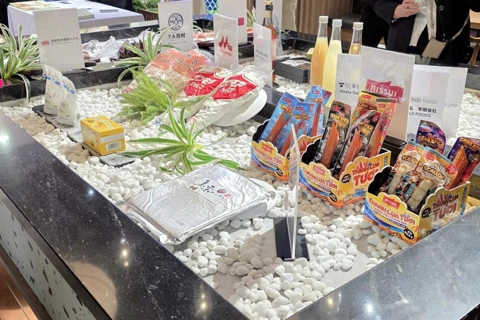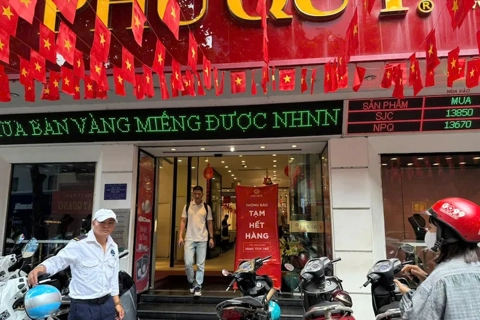Vietnam’s economy demonstrates improved adaptability to new situation
The Government is expected to continue promoting the new pillars of the green economy and sustainable growth for a rapid and sustainable recovery.
The Vietnamese economy in the past 11 months has steadily rekindled its growth momentum, demonstrating improved adaptability to both the evolving global landscape and domestic conditions, according to a report by the Ministry of Planning and Investment (MPI) at the Government’s monthly meeting today [December 6].
| Overview of the Government meeting. Photos: Nhat Bac |
The Consumer Price Index (CPI), a gauge for inflation, rose 3.46% year-on-year in November, with an 11-month average increase of 3.22%, below the 4% target set for this year.
The trade surplus has surged to $25.83 billion, marking a significant 2.5-fold increase from the corresponding period 2022.
Meanwhile, committed Foreign Direct Investment (FDI) capital reached nearly $28.85 billion during the period, showing a 15% increase, primarily driven by a substantial rise in newly registered capital (42.4%). Public investment disbursement was estimated at 65% of the yearly plan, amounting to over VND123 trillion ($5 billion), a substantial increase over the previous year.
Total retail sales of goods and services have also seen a notable uptick of 10%, while industrial production has increased by 5.8%, with the processing and manufacturing industry experiencing a 6.3% growth.
Despite these positive trends, the MPI noted that challenges persist for the manufacturing sector and businesses.
“Market uncertainties, cash flow issues, and administrative procedures continue to pose difficulties, exerting pressure on growth, exchange rate management, and macroeconomic stability,” it said.
Market challenges are evident in the decline in the 11-month import-export index. Exports have fallen by nearly 6%, with key product groups such as phones and components experiencing an 11% down 11% year-on-year. Machinery, equipment, and spare parts also saw a decrease of 6.2%. While exports to China increased by 6.2%, major export markets, including the US, ASEAN, EU, and Japan all recorded contractions ranging from 6% to 13%.
Imports have also shrunk by almost 11% over the same period, particularly in the category of production materials, which fell by 10.6%. Accessing credit and capital absorption for the economy remains challenging, with credit growth increasing by only 8.8% as of November 28, compared to a 12% increase during the same period last year.
Administrative mechanisms and procedures, particularly in some areas, have been slow to change, causing difficulties for businesses and the public, stated the MPI.
As of the end of September, the non-performing loan ratio was 4.93%, 1.93 percentage points higher than the control target. Addressing weak banks and restructuring zero-dong banks remains a challenging task. Although there have been positive changes in the real estate and corporate bond markets, close monitoring is necessary for proactive responses.
“A segment of the population continues to face hardships, as evidenced by the local increase in one-time social security payments and persistent shortages of medicine and medical supplies,” the MPI said.
In addition to grappling with the complicated and unpredictable global situation, the MPI expressed concern about the lack of consistency in forecasting efforts by authorities, resulting in passive policy advice and response. Some officials tend to avoid and fear taking responsibility, and issues persist in decentralizing certain areas, particularly in the face of emerging problems.
The Ministry emphasized the need for both short- and long-term solutions, urging that every opportunity be taken to boost the three key drivers, namely investment, consumption, and exports. It also called for promoting the new pillars of the green economy and sustainable growth for a swift and sustainable recovery.
At the meeting, Prime Minister Pham Minh Chinh reiterated the Government’s approach to tackling problems head-on. The priority, he stated, is to confront the truth and put national and people's interests first. The Prime Minister also stressed the readiness of ministries and agencies to respond effectively to external shocks.
Chinh urged all levels, sectors, and localities to make maximum efforts to surpass the achievements of 2022.
Looking ahead, the MPI foresees potential risks in the last months of 2023 and 2024. It recommended proactive and flexible monetary policy management, coupled with a cautiously expansionary fiscal policy.
“Price adjustments to essential goods and services, such as electricity, health services, and education, should be made at the appropriate level and time to minimize the impact on inflation and people's lives,” stated the MPI.
| Prime Minister Pham Minh Chinh at the meeting. |
With the implementation of the global minimum tax from January 1, 2024, the ministry proposed the development of a decree on the establishment, management, and use of the Investment Support Fund, which will be financed by this tax revenue. This will serve as a supportive policy for FDI enterprises subject to the global minimum tax.
In response to the evolving landscape of manufacturing supply chains, businesses are encouraged to seize opportunities by attracting multinational corporations to invest in emerging sectors like chip, semiconductor, and component manufacturing. The MPI said that emphasis is also placed on promoting innovation and investing in human resources, particularly in the chip and semiconductor manufacturing industry.
Recognizing the ongoing challenges faced by workers who lose their jobs, the MPI has called on the social labor sector to implement timely support solutions. The goal is to ensure stable livelihoods for workers and facilitate their transition to sustainable career paths. Simultaneously, ministries and sectors are urged to review and eliminate unnecessary business conditions that create barriers for businesses and individuals.
Wrapping up the meeting, Prime Minister Pham Minh Chinh outlined a series of solutions to alleviate challenges for production and business. These include the completion of legal regulations, a thorough review of inadequate and overlapping regulations, and the submission of proposals to competent authorities for necessary amendments and additions.
The Prime Minister instructed ministries and agencies to streamline administrative procedures and simplify business conditions with the overarching goal of enhancing the business environment. He urged agencies to actively address challenges, with a specific focus on promoting manufacturing and processing industries as well as key sectors. Additionally, he emphasized the need to expedite the progress of large-scale, high-tech, and strategically significant projects.
"Proactive measures should be taken to ensure energy security and decisively prevent shortages of electricity and gasoline in 2024," the head of government stressed.













